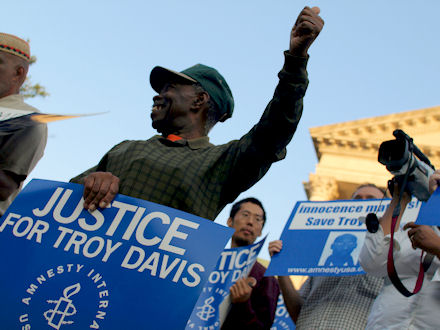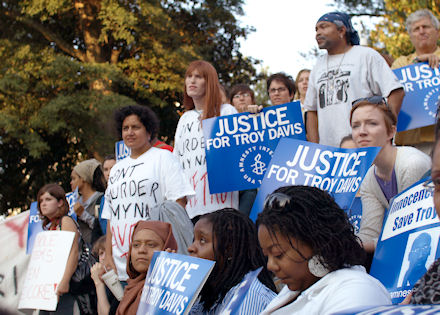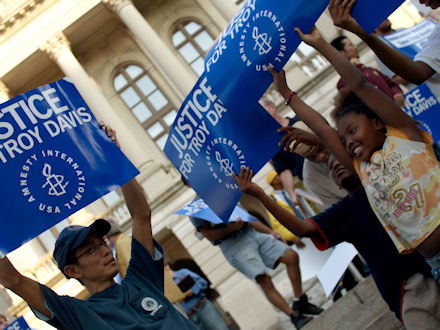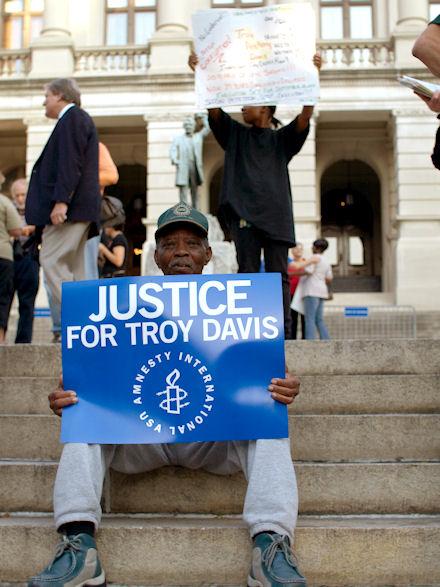Posted September 23, 2008
I met with Troy on Death Row Saturday night. He was very hopeful, but cautiously so. I asked him, “Troy, how old are you?” He said “I’m thirty-nine. I’ll be forty on my next birthday. Reverend, did you hear what I said? I’ll be forty on my next birthday.”
– Rev. Raphael Warnock
pastor of Ebenezer Baptist Church
Add “Thank you, Clarence Thomas!” to the list of things you never expected to say. Just an hour and a half before Troy Davis was scheduled to be killed for a murder he did not commit, the United States Supreme Court issued a one week stay of execution. Little more than one year ago, mounting pressure forced the Georgia Board of Pardons to halt a previous execution date. Since then, awareness of the State’s flimsy case against Davis – lack of any physical evidence, recanted or factually incorrect testimony from witnesses – has reached national and international prominence. An attempt at lynch-mob Georgia justice has grown into an embarrassment for the United States.

Recent demonstrations in Atlanta and throughout Georgia have been large and spirited. The past few days have also seen direct action such as banner drops, “die-ins” at state government buildings and demonstrations in front of the man who does the killing. Apparently this asshole is paid $18,000 per execution and lives in a humongous mansion in suburban Clayton County. Also effective was a mass national campaign to call governor Sonny Purdue (who should be remembered, among more serious right-wing offenses, for responding to a historic drought by leading a “day of prayer for rain” months after making promotion of the bass fishing tourism industry a priority.)
Tonight’s gathering at the steps of the State Capitol (amidst monuments celebrating a “Who’s Who” of Georgia white supremacist politicians) had been ominously planned as an either/or: if he lives, we celebrate, if he dies, we mourn and vigil. I’d grown more upset throughout the day and was prepared for the latter when my mother called me at 5:33pm, having just heard about the stay on radio news. As promptly as I could, I text messaged 155 of my closest friends to pass the word on and biked downtown (several text message recipients didn’t have my number – the most entertaining instance of this was from a student in New Jersey, back from the RNC demonstrations, who explained “sorry the st paul police still have my phone.”)

At the rally, smiles and hugs were exchanged as leading organizers explained details amidst planning for the next week. There is still much work to be done. Laura Moye of Amnesty International spoke on what is before us:
Chatham County Judge Penny Haas Freeman decided that she would sign and execution warrant against Troy that would be effective before the US Supreme Court even came back into session. Give me a few boos! The US Supreme Court has been on recess and they come back on Monday. We didn’t think we would be fighting in September like we have been fighting. But what the US Supreme Court has said is: “You know what? Let’s create a delay. When we get back to work on Monday, we will look at that petition and decide whether we are going to take it. They’re not going to decide whether to grant him a new trial or an evidentiary hearing on Monday. They’re simply going to decide whether they want to consider doing that. So this struggle is not over. And you need to continue to tell your friends and families to add to their name and their voice to this cause. But we at least have a little more time, Troy has a little more time to spend with his family and loved ones, to celebrate life, and we should all treasure life. Every day is a gift. So I just want to thank you again. We will celebrate today, we will organize tomorrow!
Watch this blog for updates over the next week.
Some thoughts on the last-minute stay
The facts of Troy’s innocence have been clear for nearly two decades, so why did it take up until this evening to give him one more week? I have not been deeply involved with death penalty abolition work, but from following some of the main cases it seems like the stays of execution are always handed down when things are down to the wire. This seems to be a way for the state to simultaneously “give” to pressure from below while maintaining as much authority as possible. For example, although I began this update with a sarcastic appreciation of Clarence Thomas (who supposedly initiated the action of the Court), some people at the rally were more forcefully expressing gratitude. The Courts assume a Godlike power to determine life and death.

At moments like these, as we continue to organize, it is vitally important to recognize and explain that they were forced to respond to pressure from below. If Troy’s life is saved, it will be through the hard work of his family and many friends who have tirelessly worked, not the enlightenment of government officials. It may be temporary euphoria of today’s emotional rollercoaster, but I am optimistic. The intervention of federal government demonstrates that this case has escaped the internal politics of the US and become a matter of international importance. On that stage, the US has been proven vulnerable to embarassment around its hypocritical neglect for human rights. In a high-profile case like this, it seems like they have more to lose than to gain by killing an innocent man. The task is to continue to make it more high profile. Over the next week, please visit http://amnestyusa.org/troy to keep up with the ongoing struggle.

[Please feel free to use these photographs for anything related to Troy Davis or death penalty abolition activism. If you’d like higher quality or other photos, contact me.]
